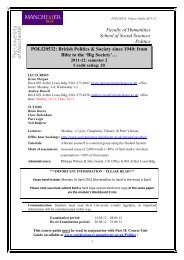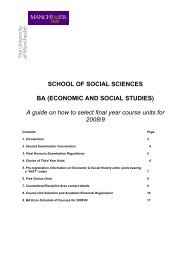CHNN 22, Spring 2008 - School of Social Sciences
CHNN 22, Spring 2008 - School of Social Sciences
CHNN 22, Spring 2008 - School of Social Sciences
You also want an ePaper? Increase the reach of your titles
YUMPU automatically turns print PDFs into web optimized ePapers that Google loves.
a major factor in his decision, on moving house in 1982, not to install a telephone. Nonetheless, he<br />
was generous with his time and knowledge to any serious scholar who approached him.<br />
The emergence <strong>of</strong> glasnost in the USSR under Gorbachev, and the greater historical honesty it<br />
brought, excited Monty greatly, even though he was rightly pessimistic about the USSR’s overall<br />
prospects. Following the collapse <strong>of</strong> the USSR and the historical experiment it represented, he<br />
continued to rethink the Soviet historical experience. One <strong>of</strong> his last significant published articles,<br />
in 1997, wondered whether the alternative <strong>of</strong> a ‘homogeneous socialist government’ propounded by<br />
the left mensheviks and others in 1917 might have led to a better outcome in Russia. It was a<br />
tragedy that ill-health during his last five years prevented him from developing his ideas further.<br />
Francis King, <strong>Social</strong>ist History Society<br />
An interview with Monty Johnstone<br />
This interview with Monty Johnstone was carried out by Kevin Morgan in 1999 as<br />
part <strong>of</strong> the Communist Party Biographical Project. A sound recording <strong>of</strong> the full<br />
interview, along with all other interviews carried out as part <strong>of</strong> the project, is held in<br />
the National Sound Archive <strong>of</strong> the British Library.<br />
I<br />
was born on 20 November 1928 in Henley-on-Thames, Oxfordshire. My parents had lived in<br />
Scotland but came down two months before I was born. My father had been an army <strong>of</strong>ficer<br />
reaching the rank <strong>of</strong> major in the First World War. He was very conservative in outlook and<br />
completely non-intellectual. My mother on the other hand came from a different background. Her<br />
father was a well-known writer and journalist, John Foster Fraser, who first hit the headlines with<br />
a book Round the World on a Wheel. With two others he’d ridden round the world on a bicycle,<br />
where he met my grandmother when he was going through the United States; so I’m in fact a<br />
quarter American, a point which I used to stress when people accused me <strong>of</strong> being anti-American.<br />
My grandfather wrote a whole number <strong>of</strong> other books, including three on Russia; and my mother<br />
was certainly more intellectually interested, although, like most women in that position at that<br />
time, she didn’t go to university. She tended to be leftish-oriented. In 1940, under the influence <strong>of</strong><br />
Patrick Hamilton’s wife, she actually came out in favour <strong>of</strong> a People’s Government, whatever that<br />
meant, at the time <strong>of</strong> the People’s Convention.<br />
My mother in that part <strong>of</strong> the war was put in charge <strong>of</strong> the voluntary ambulance services and one <strong>of</strong><br />
the women who was a volunteer ambulance driver was apparently Patrick Hamilton’s wife. In 1945,<br />
when we were living in Paddington, she canvassed for the Labour Party, and as a matter <strong>of</strong> fact, I<br />
used to have much more bitter political rows and arguments wth my mother than with my father!<br />
That <strong>of</strong>ten happens in terms <strong>of</strong> nearness; my father was prepared to accept in a fairly tolerant sort<br />
<strong>of</strong> way my being a communist, whereas my mother disputed all the points all along the line. My<br />
father realised he couldn’t do much about it and he liked the quiet life and let it stay. He was away a<br />
lot <strong>of</strong> the time. Having been in the army during the First World War, and then having retired, or<br />
whatever you do from the army, come the Second World War when he was considerably older, he<br />
volunteered and they put him in the air force. He had inherited some money from an uncle <strong>of</strong> his<br />
which he lived on basically.<br />
I was at a preparatory school in Oxford, a place called the Dragon <strong>School</strong>, which I supposed you’d<br />
call liberal-progressive: a mixture actually <strong>of</strong> liberal-progressive and, in some <strong>of</strong> the subjects,<br />
traditional. I was there till thirteen and then subsequently I was at Rugby <strong>School</strong> where I was<br />
awarded a senior scholarship. Already when I was at the Dragon in Oxford, I joined the YCL at the<br />
age <strong>of</strong> twelve in 1941. I can recall having already been sympathetic to communism; for instance, I<br />
was very upset when the Daily Worker was banned in 1941, so even before the entry <strong>of</strong> the Soviet<br />
Union into the war I was sympathetic towards the communist party and communist ideas.<br />
Clearly the whole pro-Soviet atmosphere after the Soviet Union came into the war in June 1941 did<br />
help to reinforce this, although the ideas were there before – it wasn’t just a question <strong>of</strong> joining in<br />
’42-’43, in the Stalingrad period. I can even remember, it must have been in August ’41, going<br />
23
















